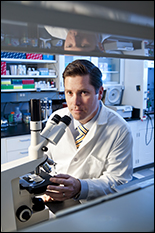Fisher Leads Overseas Project to Develop New Class of Biomaterials for Regenerative Medicine
Fischell Department of Bioengineering (BioE) Professor and Associate Chair John Fisher was named the recipient of a Fulbright Scholar fellowship this summer. Fisher will apply his fellowship to work towards developing a new class of biomaterials for regenerative medicine applications at the National University of Ireland, Galway (NUIG) through the end of the calendar year. Fisher hopes that his work with NUIG will lead to the development of a novel, natural-synthetic hybrid material that can act as a lasting replacement for malfunctioning or diseased tissue in the cardiovascular system. Each year, clinicians perform procedures to implant more than 175,000 prosthetic valves and 600,000 vascular grafts to replace damaged native structures. For such procedures, biological tissues offer clear advantages over synthetic substitutes as materials for prosthetic applications. In addition to their inherent bioactivity, biological tissues possess “intelligent” elastic and mechanical properties that cannot be replicated by manmade material. One such material historically used for cardiovascular repair is pericardial tissue – tissue derived from a thin, elastic membrane that surrounds the heart. Pericardial tissue is ideal for prosthetic applications because of its availability, inherent strength, and elastic properties; but, as is the case with transplanting any natural tissue into new environments, there are challenges. Transplanting natural tissue can result in an inflammatory immune response from the host, as well as chemical and biological degradation. To combat such challenges, bioengineers often preserve pericardial tissue in glutaraldehyde (GA), which chemically crosslinks the collagen and elastin molecules that compose the tissue. But, while this process is effective at stabilizing the tissue against chemical and enzymatic degradation, it often results in detrimental calcification of the implant. As such, Fisher and fellow bioengineers are developing a way to apply a paintable, biodegradable polymer – poly(propylene fumarate) – to the surface of pericardium tissue. Their hypothesis is that the polymer will provide physical support without eliciting a significant immune response. Fisher believes that the research his team conducts at NUIG will benefit both the laboratories in Galway and at the University of Maryland. While Fisher’s UMD Tissue Engineering and Biomaterials Laboratory has developed considerable expertise in areas including synthetic polymer synthesis, biomaterials fabrication, and 3-D printing, NUIG’s specialties include tissue engineering scaffold fabrication, atomic force microscopy, and dynamic mechanical analysis. As such, Fisher believes his Fulbright Scholar fellowship project will help establish a foundation for the future exchange of both student researchers and scientific ideas between the laboratories at Galway and Maryland.
Related Articles: September 18, 2015 Prev Next |


